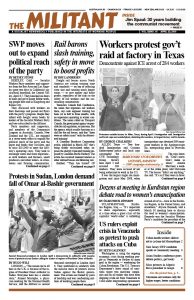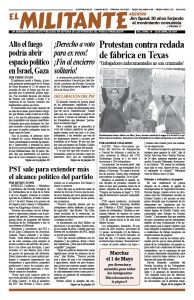Washington is using the ongoing economic crisis facing working people in Venezuela to further its main goal in the region — weakening the Cuban Revolution. The U.S. Treasury Department’s latest round of sanctions target two maritime companies and an oil tanker that have been shipping crude oil from Venezuela to Cuba under longstanding agreements between the two sovereign nations.
The Treasury Department also designated 34 ships owned by Venezuela’s oil company as blocked property, prohibiting all transactions with them.
In an April 5 speech announcing the reactionary measures aimed at increasing hardships on working people in Cuba, Vice President Mike Pence promised that “in the coming weeks, the United States will be taking even stronger action against Cuba.”
The U.S. government — no matter which party has occupied the White House — has carried out unremitting efforts to bring down the revolutionary government that came to power in 1959 when workers and farmers in Cuba overthrew the U.S.-backed dictatorship of Fulgencio Batista.
To justify the latest measures, Pence turned reality on its head, charging that “Cuba’s leaders are the real imperialists in the Western Hemisphere.” He claimed that “Cuba exports tyranny and strong-arm tactics” and “has tried to create client states across this region. … Cuba’s influence has driven Venezuela’s failure and the time has come to liberate Venezuela from Cuba.”
But it is U.S. imperialism, not the Cuban Revolution, that has a history of backing dictatorial regimes and blatantly violating national sovereignty in Latin America and the Caribbean.
The U.S. rulers invaded the Dominican Republic in 1965 to crush a movement demanding the return of the elected president there; backed the overthrow of the Salvador Allende government in Chile in 1973 and the imposition of a bloody dictatorship; backed death squads in El Salvador for over 30 years from the 1960s; organized and financed the contra war against Nicaragua in the 1980s; and armed and backed military dictatorships from Brazil to Argentina.
Cuban internationalist volunteers
After Hugo Chávez won election as president of Venezuela in 1998, in the midst of a rise in struggles by workers and peasants, Havana agreed to help his government expand medical care, educational opportunities and access to culture. At the same time the Venezuelan government began selling up to 100,000 barrels of oil a day to Cuba — at below world market prices — like it did to many Caribbean nations, and providing free heating oil to some working-class neighborhoods in the Bronx, New York.
Thousands of Cuban internationalists have taken part in these social programs in Venezuela. This included doctors and nurses, who went to the poorest neighborhoods and the most isolated regions to provide medical care; teachers, who helped organize a campaign to teach illiterate workers and farmers how to read and write; as well as sports and dance instructors. The internationalist volunteers also included some military advisers.
There are more than 20,000 Cubans still volunteering there today, mostly health care workers. Cuba carries out similar missions around the world.
Washington’s slander campaign
Aiming to tarnish the example set by the Cuban Revolution in the Americas and around the world, Washington and enemies of the revolution, both liberal and conservative, falsely claim Cuban agents have “hijacked” Venezuela, “run” its army, and use the same “repressive measures” used in Cuba in “a way that is almost invisible.”
None of this is true. Medical volunteers from Cuba serve all who need care. And Cuban revolutionaries have never conditioned their aid on agreement with the course of the governments that asked for their help.
In Cuba, working people, under the leadership of Fidel Castro, not only overturned the Batista dictatorship, but dismantled the old army; advanced workers control over production; carried out a deep-going land reform, which broke the power of the landlords and agribusiness; and nationalized foreign companies and large Cuban-owned corporations. Workers and farmers took power and opened the road to a socialist revolution. These transformations are the foundation for the continuation of the revolution to this day, not “repressive measures.”
In Venezuela, Chávez and Maduro led what they called a “Bolivarian Revolution,” which tried to administer and regulate capitalism, alongside a range of welfare programs. Their course and policies are radically different than those carried out by the workers and farmers in Cuba.
In the midst of the deepening capitalist economic crisis and an international fall in oil prices — striking the heart of Venezuela’s economy — the Maduro government has cut the amount of subsidized oil it provides to Cuba by as much as 50 percent.
Cuba’s Prensa Latina reported in March that Multibank Panamá has closed all the bank accounts it held covering financial transactions with Cuba.
U.S. banking sanctions hit Cuba
Bank officials denied that the action was due to U.S. sanctions and pressure. But Prensa Latina investigated further and confirmed that the measure is exclusively aimed at Cuba.
Granma, the newspaper of the Communist Party of Cuba, replied to Washington’s moves, quoting from a 1990 speech by Fidel Castro. “If we had given in even once to the imperialists’ demands, the Cuban Revolution would not exist,” Castro said. “What has stopped the imperialists is the heroism of our people, the price that they know they would have to pay for any aggression against our country.”
If you have any question this is true, watch the million-strong May Day march coming up in Havana.

